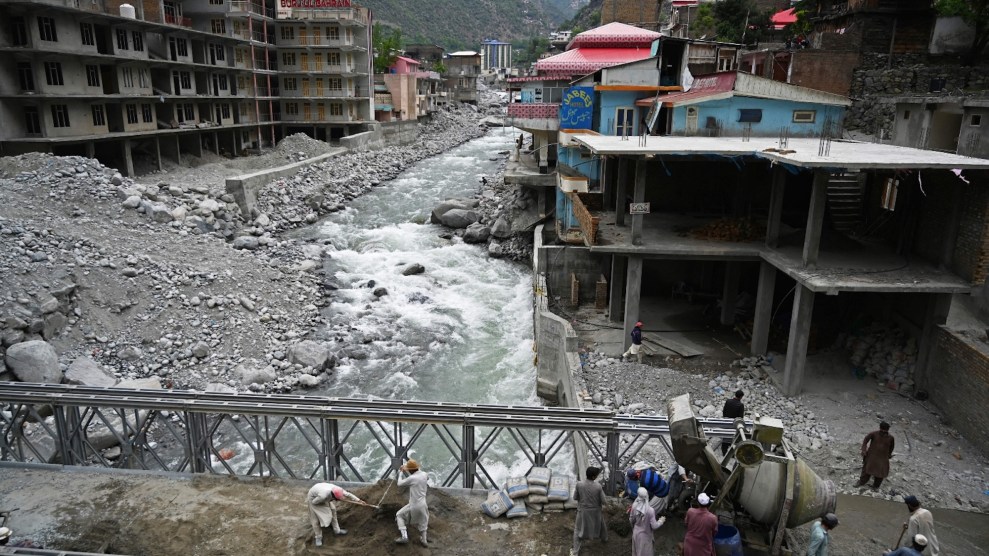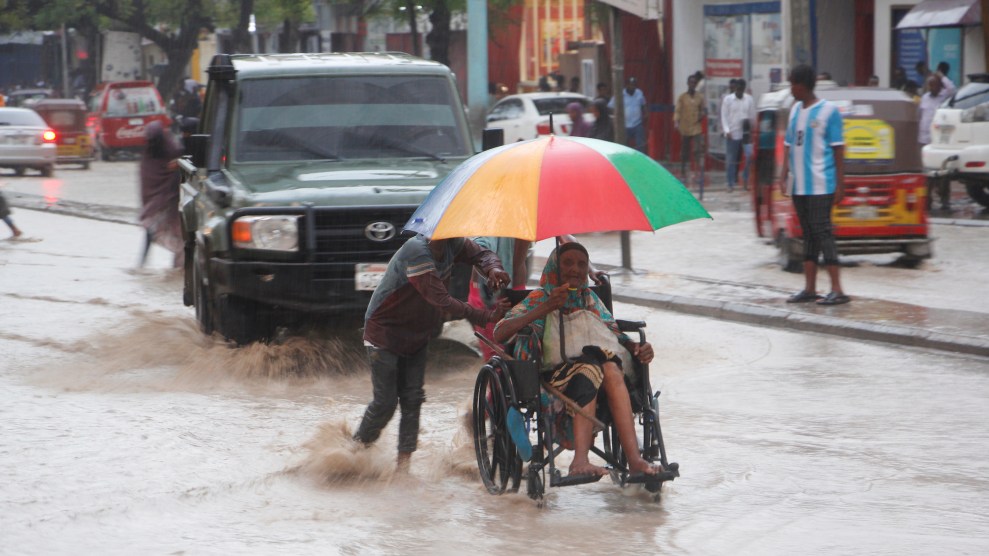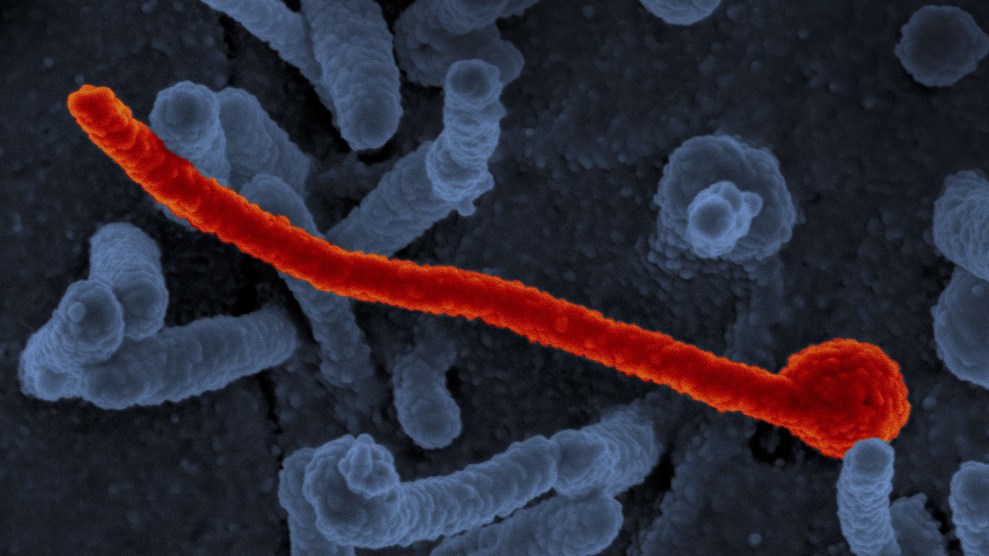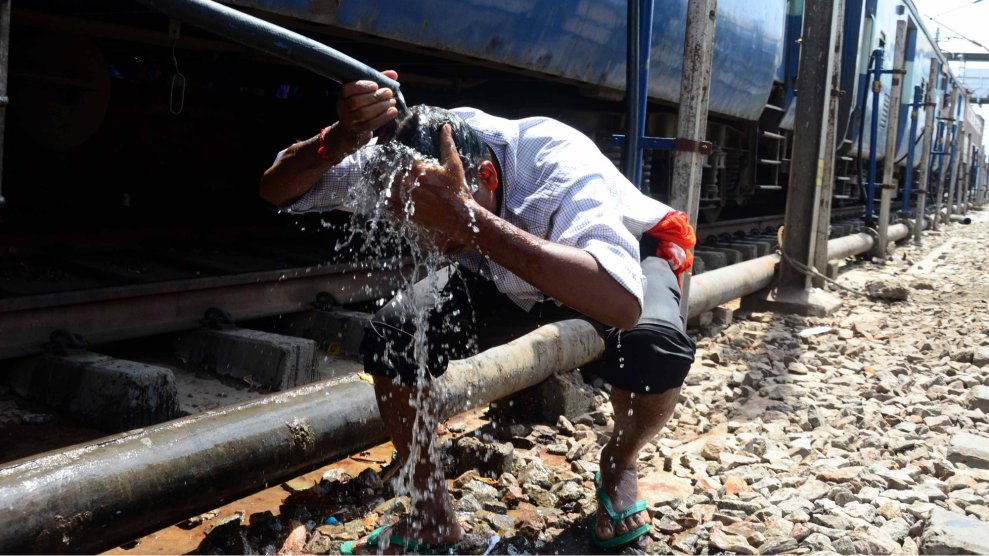
Pakistan was lashed by unprecedented monsoon rains in the summer of 2022 that put a third of the country underwater, damaged 2 million homes, and killed more than 1,700 people.AAMIR QURESHI/AFP/Getty/Grist
This story was originally published by Grist and is reproduced here as part of the Climate Desk collaboration.
In the early 2000s, as climate denialism was infecting political institutions around the world like a malevolent plague, an Australian epidemiologist named Anthony McMichael took on a peculiar and morbid scientific question: How many people were being killed by climate change? McMichael’s research team tallied up how many lives had been lost to diarrheal disease, malnutrition, malaria, cardiovascular disease (a proxy for heat-related illness), and flooding, worldwide, in the year 2000. The researchers then used computer modeling to parse out the percentage of those deaths that were attributable to climate change. Climate change, they estimated, was responsible for 166,000 lives lost that year.
The world has changed a great deal since. Climate denialism is no longer the world’s de facto climate policy, in large part because the impacts of rising temperatures have become impossible to ignore. The field of climate research has grown apace, and the science behind how climate change affects everything from ultra-rare species of frogs to the velocity of baseballs to the intensity of heatwaves, droughts, floods, and hurricanes has become astonishingly precise. But the research assessing how many people are currently being killed by the climate crisis has remained conspicuously stagnant. While a small handful of studies have attempted to quantify the effect of climate change on mortality decades into the future, the McMichael standard, an ambitious relic of the early 2000s, is still the only estimate of its kind.
This week, a climate and health researcher published a commentary in the journal Nature Medicine that takes the McMichael standard to its logical conclusion. By the end of this year, Colin Carlson, a global change biologist and assistant professor at Georgetown University, wrote in the commentary provided exclusively to Grist, climate change will have killed roughly 4 million people globally since the turn of the century. That’s more than the population of Los Angeles or Berlin, “more than every other non-COVID public health emergency the World Health Organization has ever declared combined,” said Carlson, who also runs an institute focused on predicting and preventing pandemics.
And 4 million lives lost due to climate change, a breathtakingly high number, is still an underestimate—probably a big one. The McMichael standard doesn’t include deaths linked to climate-driven surges of the many non-malarial diseases spread by mosquitoes, like dengue and West Nile virus. It doesn’t incorporate deaths caused by deadly bacteria, fungal spores, ticks, and other diseases or carriers of disease that are shifting in range and breadth as the planet warms. It doesn’t examine the impacts of wildfires and wildfire smoke on longevity. It doesn’t look at the mental health consequences of extreme heat and extreme weather and the related increase in suicides that have been documented in recent years. “At the time we were doing it, we already knew it was conservative,” said Diarmid Campbell-Lendrum, a coauthor of McMichael’s 2003 study who is now the head of the climate change and health unit at the World Health Organization.
The list of potential impacts that would need to be assessed in order to gain a complete picture of the climate death toll is long and, thus far, no researcher has endeavored to make a full accounting. “Climate change is killing a lot of people, nobody is counting it, and nobody is moving in the direction of counting it,” Carlson said. “If it were anything but climate change, we would be treating it on very different terms.”
Wael Al-Delaimy, a multidisciplinary epidemiologist at the University of California, San Diego, agreed that 4 million deaths since 2000 is “definitely an underestimate.” A significant lack of mortality data in low- and middle-income countries is one of the biggest obstacles standing in the way of a proper update to the McMichael standard. “The main challenge is mortality is not well documented and measured across the globe, and low- and middle-income countries suffer the most because they are not prepared, and there are no real epidemiological studies trying to link it to climate change,” Al-Delaimy said.
The paucity of epidemiological data limits the methods researchers use to calculate climate-linked mortality in the first place.
Researchers who want to investigate how many deaths from a particular disaster are due to climate change typically employ a method called attribution science. To understand the effect climate change has on mortality, scientists will use statistical methods and computer models to determine how climate change has influenced the drivers of a discrete event, such as a heatwave. Then, they’ll quantify the portion of heat-related deaths that can be attributed to climate change-related factors, using observed mortality data. As Al-Delaimy noted, mortality data isn’t always available. Attribution science, in the context of climate-related mortality, is a tool that’s useful, specialized, and—in the view of experts like Carlson—limited by patchy data.
McMichael did not rely on attribution science to reach his conclusions, partly because the technique was still in its infancy when he was conducting his mortality work. Instead, he used existing climate models to approximate how climate change was affecting specific illnesses on a global scale. His research team figured out how diarrheal disease, malnutrition, and the other factors they chose to include were influenced by warming—for example, they estimated a 5 percent increase in cases of diarrhea per every degree Celsius change in temperature—and then based their calculations on those findings. “To be honest, nobody had been arrogant enough to ask that question before—what is the total burden of disease from climate change?—because obviously it’s a very huge and difficult question,” Campbell-Lendrum said.
Carlson thinks the path forward builds on this work. Success hinges on predictive computer modeling, he said: research that can simulate disease spread and climate conditions and make predictions about how these patterns may change in the future. Predictive modeling doesn’t require researchers to track down mortality data counting every single person who died in a particular extreme weather event. The answer to the question of how many people have been killed by climate change, Carlson said, can be answered by developing a predictive modeling-based protocol for how researchers measure climate change-related deaths. He aims to gather the world’s leading climate and health experts together this year to build out exactly such a system. Getting researchers “baking to the same recipe,” he said, could ultimately produce an updated, more accurate climate mortality estimate.
Developing something resembling a universal climate mortality protocol won’t be simple, but it could accomplish what McMichael set out to do in the 2000s: furnish the public with a rough understanding of the full climate death toll, not 50 years into the future, but as it is happening right now. “If you don’t know how big the challenge is, you can justify not investing in the challenge,” said Kristie L. Ebi, a climate and health researcher at the University of Washington. Mortality data drives policy, and more policy is needed to protect the public from what’s coming—and what’s already here.
In the summer of 2022—a cooler summer than the summer of 2023, which is on track to be eclipsed by the summer of 2024—extreme heat in Europe caused over 60,000 deaths between the end of May and the beginning of September. Since early 2023, clouds of mosquitoes, spurred by unusual flooding and an intensifying monsoon season, have spread dengue fever across huge swaths of the world, infecting nearly 5 million people and causing more than 5,000 deaths. Last year’s extreme weather events killed 492 people in the US—one of the countries that is best-equipped to deal with the fallout from extreme weather.
A deadly trend is underway. As McMichael put it in an open letter published just weeks before he died in 2014, “Our mismanagement of the world’s climate and environment is weakening the foundations of health and longevity.” And yet, a very small proportion of the 4 million deaths caused by climate change so far, Carlson wrote in his commentary, “will have been recognized by the victims’ families, or acknowledged by national governments, as the consequence of climate change.” What would happen if people knew the true scope of the risk at hand? Carlson aims to find out.















